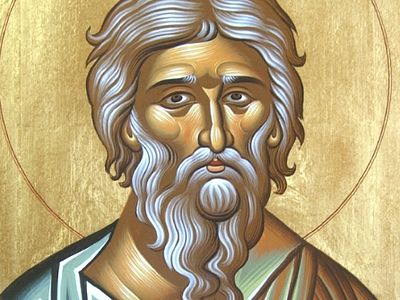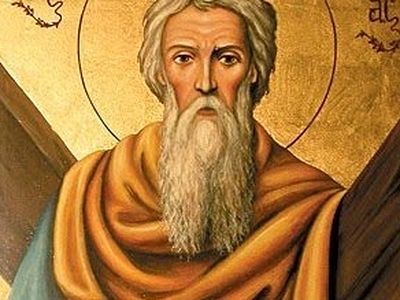Walking through this dark, cold morning, did you happen to ask yourself, “What in the world am I doing?”
What were we looking for when we got out of bed this morning? What were we looking for when we came to this place—whether we came from the other side of the world, or the other side of the street?
Have we found it? What are we looking for now?
When St. Andrew first followed Jesus, our Lord looked at him and asked, “What do you seek?”
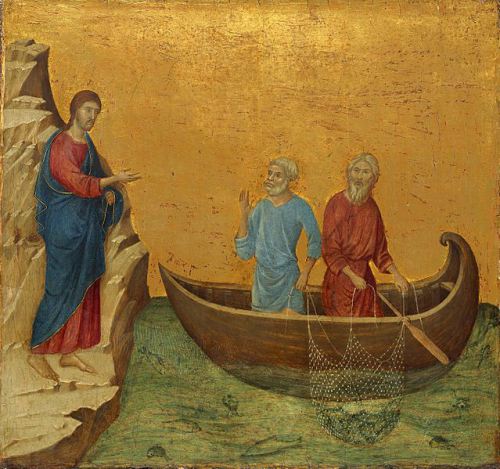 The calling of the apostles Peter and Andrew. Duccio di Buoninsegna.
The calling of the apostles Peter and Andrew. Duccio di Buoninsegna.
What were we seeking when we were first called?
Something inspired us to leave everything and follow Christ to this place. Perhaps it was a fire that burned in our souls, or a light that guided us through the darkness, or a Word that spoke to us in our loneliness.
As Andrew, and Simon Peter and Phillip and Nathanael are called, they leave everything and follow Christ. And we can imagine that in those early days, there was a great deal of excitement, perhaps even some back slapping and self-congratulation. “We have found Him of whom Moses in the law, and also the prophets, wrote—Jesus of Nazareth, the son of Joseph.”
We have found Him, you and I, we are the chosen ones, we can see something amazing in Jesus, and so we leave everything to follow Christ.
But it is a LONG path.
It stretches from the wilderness of Jordan, throughout the Galilee, across the perilous waters of that sea, to the land of the Gaderenes and back, and ultimately the path leads up the long and treacherous road to Jerusalem.
It is a path that starts out bright, hopeful, exciting, thrilling even, but it gets harder, and harder.
And standing there on the Mount of Olives, looking across the Kidron Valley at the Temple, we wonder, just as Andrew did, “Lord, all that you have foretold, when will it come to pass?” But when it becomes clear that the journey ends with a shameful, dishonorable death on Golgotha, nailed to the cross, we realize just how hard it is to follow Christ.
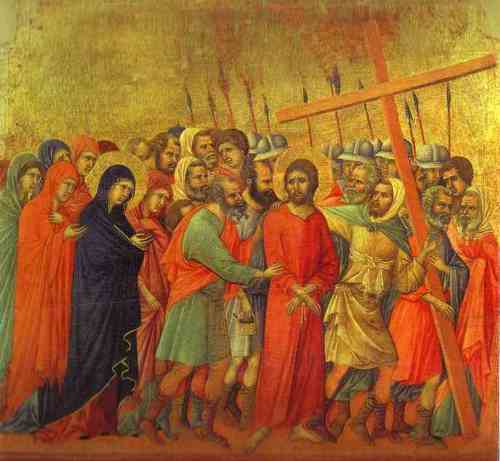 The carrying of the cross. Duccio di Buoninsegna.
The carrying of the cross. Duccio di Buoninsegna.
It was not easy for St. Andrew, and it is certainly not easy for us.
But it is frighteningly easy to fall away. So frighteningly easy to deny Christ, voluntarily or involuntarily, in word or in deed, in knowledge or in ignorance.
And so today, on this cold, dark, morning, we may feel a bit like Andrew and the other disciples who were so dispirited as Jesus hung upon the Cross. But just because we might be dispirited, does not mean that we are defeated.
In those dark days, Andrew’s faith may not have burned as bright as it once had in those exciting days of leaving everything and following Christ. And this morning maybe our faith does not burn as bright as it once did, when we first we made exciting decisions to go off in new directions. Perhaps Andrew’s faith was nothing more than the tiniest spark of a smoldering wick. And perhaps that is all the faith that we have.
But that one small spark is all it takes.
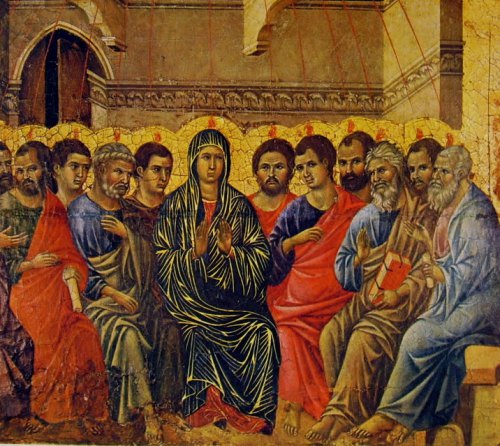 Pentecost. Duccio di Buoninsegna.
Pentecost. Duccio di Buoninsegna.
In that upper room on the day of Pentecost, when the Holy Spirit descended upon the apostles, the smoldering wick of faith was fanned into a tongue of fire. No matter how weak their faith had been, each one of them became a light in the darkness, and they were sent out into the world to bring Christ to a lonely world.
At that moment Andrew began to understood his calling.
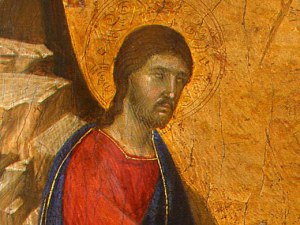
No matter where he was, no matter what he was doing, no matter how dark or cold, he needed to look no further than his own heart, for as St. Paul says, “God’s love has been poured into our hearts through the Holy Spirit.” (Rom 5.5) Filled with that love, Andrew saw the image of God in everyone he met. He saw the image of God in the poor, the angry, the sick, the despairing, the lonely, the stranger. It was this love of God that allowed him to rejoice and give thanks even as he offered his life as a martyr.
Today as we give thanks in this Liturgy, we pray to God, “Send down your holy spirit upon us and upon these gifts.” As we pray this prayer today, may God remind us of the moment that we were first called.
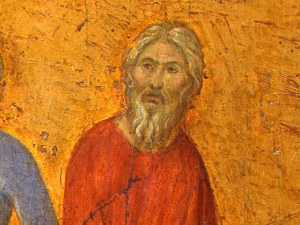
By the prayers of St. Andrew the First Called, may our hearts catch fire with faith in our Lord and Savior Jesus Christ. Amen.


